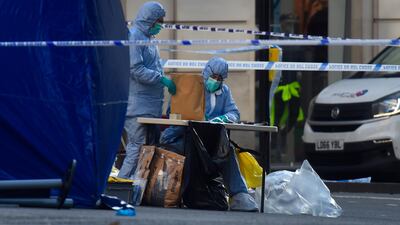Usman Khan was known to police when he stabbed and killed two people on London Bridge in broad daylight on Friday. Khan had been convicted in February 2012 as part of a terrorist cell that had plotted to blow up the London Stock Exchange and the American embassy, among other targets. Three members of the nine-man cell from Stoke-on-Trent in the UK Midlands, inspired by Al Qaeda, were initially supposed to be held in prison indefinitely because of the threat they posed to the public. A year after the sentencing, however, the Court of Appeal relented and gave its three masterminds – including Khan – fixed-term sentences instead. Presiding appeal judge Lord Justice Leveson said at the time: "Terrorism comes in many different forms. This offence [of preparing for acts of terrorism] is particularly wide, covering acts just short of an attempt to conduct that only just crosses the line into criminality."
On Friday, that deeply troubling decision proved to be fatal. Khan, who was released in December last year after serving exactly half of his 16-year sentence – as the applicable law states – launched a frenzied attack, armed with two knives, killing a man and a woman and injuring at least three others before he was shot dead by police officers.
As London once again contemplates the tragic aftermath of a fatal terrorist attack, questions are rightly being asked about whether there are sufficient measures in place to protect the public. Had the original sentence stood, Khan and his cohort Nazam Hussain, described by the judge as “the more serious jihadists”, would most likely still be behind bars. The new UK Counter-Terrorism and Border Security Act, which came into effect in April this year, gave tougher sentencing powers of up to 15 years for lesser crimes such as collecting or disseminating terrorist material. It also offered judges the opportunity to give indeterminate sentences for crimes such as belonging to a proscribed group, rather than having to wait until suspects had committed violent or terrorist acts before issuing such tough penalties.
At the time of the appeal hearing, the criminal landscape in Britain was markedly different. Khalid Masood had yet to drive a rental van at pedestrians on London's Westminster Bridge in 2017, killing five people. And a terrorist gang had not yet prowled London Bridge and nearby Borough Market, killing eight people and injuring 48. Nor had 23 people – many of them children – died in a suicide bombing at an Ariana Grande concert in Manchester Arena. These fatal incidents had yet to happen when Khan's sentence was downgraded, but they had already taken place before he was released. The Parole Board said he was released automatically on licence after reaching the midway point in his sentence. It suggests a woefully inadequate system that is still missing essential joined-up thinking that could save lives.
British Prime Minister Boris Johnson has said it is a "mistake to allow serious and violent criminals to come out of prison early". The Guardian newspaper last year found more than 80 convicted terrorists were due for automatic release because they had come to the end of their sentences, including extremist preacher Anjem Choudary, a close friend of Khan. The threat comes not just from Islamists like Khan but also right-wing extremists; there is extensive evidence of both being radicalised behind bars. Greater provision must be made to monitor such recruitment by extremists in prison and to properly assess convicts before they are released to ensure they will not reoffend. Probation workers have complained they are overstretched. They must receive proper support and training in recognising those who could be a danger if released as it could mean the difference between life and death for potential victims.
London has proven resilient in bouncing back from such attacks and it will undoubtedly do so again. But it should not take yet more fatalities to serve as a reminder of the need for greater vigilance and care in protecting the public. There are currently more than 220 people being held on terrorism-related offences in Britain. It only takes one lone wolf to cause devastation, as Khan proved on Friday. A counter-narrative to his message of hate must be projected loudly before the ideology that he was indoctrinated with strikes again.

